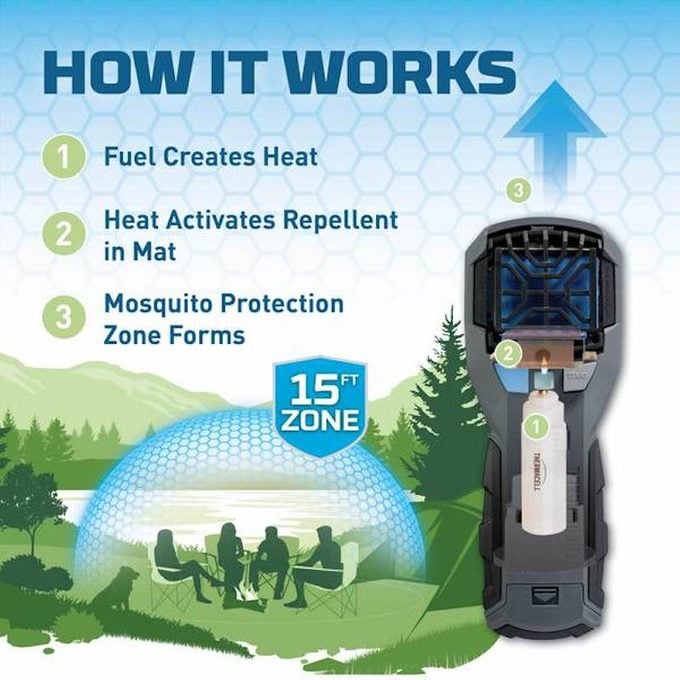We Tried It: Thermacell Mosquito Repellent Review
Updated: Jun. 18, 2024

If you're looking to keep mosquitoes away from your campsite or a backyard gathering, the Thermacell has you covered.
Our editors and experts handpick every product we feature. We may earn a commission from your purchases.Learn more.
Whether it’s reading in the backyard hammock or listening to a gurgling stream on a camping trip, I would rather spend time outdoors than just about anything else. But time outside is quickly ruined when mosquitoes target the slightest patch of uncovered skin.
There are steps you can take to keep mosquitoes away, like candles that don’t really work all that well, or slathering yourself in bug spray or mosquito repellent. Still, if you’re like me, the flying pests always seem to find you. So when a friend suggested the Thermacell, I was game to give it a shot.
On This Page
What Is Thermacell?
Mosquitoes are bad news. They carry diseases like the West Nile Virus, the most common mosquito-borne disease in the U.S. In 2020 there were more than 650 reported cases, according to the Centers for Disease Control and Prevention (CDC). And while that represents a small percentage of the overall population, it’s not something to take lightly.
Beyond that, mosquito bites can quickly take the fun out of what should be some relaxing time outdoors.
Thermacell products use heat to activate a repellent that keeps mosquitoes away within a 15- to 20-ft. radius, depending on which product you’re using. Two models are battery powered. The rest use butane or, in the case of the Backpacker model, pressurized backpacking stove fuel canisters with a mix of butane and propane.
They’re silent and odorless, so you just turn them on and wait for them to heat up. They take about 10 minutes to reach the maximum coverage area. How long they last depends on which model you’re using.
The battery-powered Radius, which works while it charges, automatically shuts off after two hours to conserve repellent. The butane cartridge that powers the MR450, which we tested, lasts about 12 hours, and the repellent pad gives you four hours of protection.

Does Thermacell Really Work? How We Tested
I took the MR450 on a weekend camping trip with the family along the Conejos River in Colorado’s Rio Grande National Forest in June — prime mosquito season. After a short hike along the river, we returned to our campsite around 5 p.m. to prepare dinner. Mosquitoes were already bothering us, so I fired up the Thermacell.
This was my first time using it, and I probably should have given it a practice run ahead of time. It was easy enough to set up — there was really nothing to it — but it took me a few minutes to figure out how to turn it on.
The push button ignition is simple enough, but there’s no indicator telling you that the device is running; you can vaguely hear it. And it took about 15 minutes to start working. You need a little patience, or at least read the instructions more throughly than I did.
Finally, I quit fiddling with it and left it alone to do its thing. I placed it on the picnic table while we prepared dinner. Fifteen minutes later, we noticed the constant buzzing around our ears had stopped. It stayed that way as we finished dinner and cleaned up, right on through to some intense card games. We stayed up a little later than usual, so I replaced the pad in the Thermacell once before turning in for the night.
The 15-foot zone of protection seemed accurate; I didn’t measure it exactly. From the picnic table, it covered the space where we set up the stove, the coolers and the washing station.
When I left that zone to use the restroom, the mosquitoes quickly found me and hung around until I got back. That’s definitely one drawback to the Thermacell. You can’t carry it with you because the protective cover won’t set up as long as you’re moving. However, there is a belt clip so you can attach it to you while you’re fishing, cutting wood, etc.
The wind can also disrupt protection when you’re using it in a single spot. But the wind also helps keep the flying pests away.
Final Verdict on Thermacell
Spray-on repellents with DEET are still considered to be the most effective way to keep mosquitoes at bay. But a spatial repellent like the Thermacell is an excellent option when you’re outside and relatively stationary or for those times when covering yourself in bug spray isn’t an option, like a backyard dinner party. Keep both options in your camping kit; the spray protects you when you’re on the move.
The Thermacell would also be a great addition to your deck. The battery-powered Radius and E55 models are designed for them.
Where to Buy
You can get them just about anywhere. The company’s products are also available on Amazon. Prices range from $15 to $50.




















